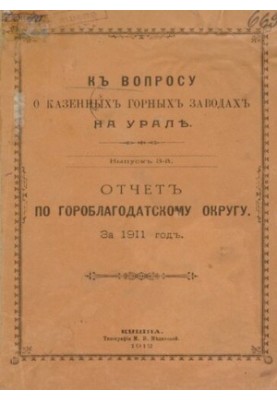To the question of loss-making of state-owned mining plants in the Urals. Issue 3: Report on the Gorodgradatsky District for 1911
 Instant download
Instant download
after payment (24/7)
 Wide range of formats
Wide range of formats
(for all gadgets)
 Full book
Full book
(including for Apple and Android)
"On the issue of loss of state-owned mining plants in the Urals . Issue. 3: State District Report 1911 by A. C. Levitsky is a unique historical document that immerses the reader in a complex and multifaceted era of Russia's industrial development at the beginning of the 20th century. This book is an in-depth analytical report, revealing the details of the functioning of state-owned mining enterprises in the Gorogodlatsky district, and serves as a valuable source for those who are interested in the history of industry, economics and resource management in pre-revolutionary Russia. Author, A. C. Levitsky, a well-known researcher and specialist in the field of industrial history, creates a bright and rich picture of the time. His style is distinguished by accuracy, analytical insight and attention to detail, which makes the book not only a scientific work, but also an exciting reading for a wide range of readers. In this report, he carefully considers the reasons for the loss of state-owned mining plants, analyzes economic indicators, technological features and management decisions that ultimately influenced the efficiency of enterprises. Particular attention is paid to the peculiarities of the work of the Gorobladzhatsky District, its resources, working conditions and social aspects related to the development of industry in the region. On the issue of loss of state-owned mining plants in the Urals . Issue. The report on the Gorodgradsky district for 1911” will become an indispensable source for historians, economists, researchers of the industrial revolution and anyone who wants to understand the mechanisms of functioning of state-owned enterprises in pre-revolutionary Russia. It is suitable for readers aged 18 years and older who are interested in the history of the economy, industrial policy and development of the Urals as an industrial center of Russia. Also, the book may be of interest to students, graduate students and teachers dealing with the history of Russian industry, as well as lovers of nostalgia for the era of industrialization. The topics raised in this work cover a wide range of issues from the technical aspects of mining operations to the socio-economic consequences of their activities. The focus is on the causes of loss, the effectiveness of management decisions, the impact of natural conditions and technological innovations on production performance. The author not only analyzes the reasons for the current state of affairs, but also suggests possible ways to solve them, which makes the book relevant for modern specialists interested in the history of industry and resource management. The special advantage of this book is its historical value .. It allows you to trace how the foundations of the industrial infrastructure of the Urals were formed, what difficulties faced by the heads of enterprises and how these difficulties affected the economic situation of the region. Levitical masterfully combines an analytical approach with a live description of events and conditions, which makes reading not only informative, but also exciting. For those who are looking for books about the industrial history of Russia, similar in genre to works on economic history or research of industrial development, this publication will be an excellent addition to the library. It can be of interest to lovers of historical analytics, researchers and students studying mining development and public administration in the pre-revolutionary period. In General, "On the issue of loss of state-owned mining plants in the Urals. Issue. The 1911 County Report is not just a report, but a living testimony to an era that reveals the mechanisms and reasons behind the region’s industrial successes and failures. This book deservedly takes its place in a number of significant studies that allow us to understand how Russian industrial power was formed and what lessons can be learned from the past for modern development.
LF/298932722/R
Data sheet
- Name of the Author
- А. С.
Левитский - Language
- Russian


















